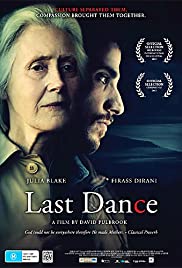
LAST DANCE
Australia, 2012,
Julia Blake, Firas Dirani, Alan Hopgood.
Directed by David Pullbrook.
This is a Melbourne story about terrorism. There is murder in a mall. One of the terrorists escapes and finds himself in a suburban street. He goes into the house which is owned by a Jewish widow whom we have seen in a baker’s shop, doing her ordinary shopping, chatting to her neighbours, phoning her niece.
However, the film becomes a two-hander, the widow and the terrorist. While he threatens her, he is wounded. She takes care of him. He becomes less suspicious of her, he is less cold-blooded than she originally thought. He allows himself to become dependent on her.
The film serves as a contemporary urban fable for dialogue between Jews and Arabs. He is less threatening. She is more sympathetic and understanding. She covers up from police and neighbours that he has been in the house. She arranges a ticket so that he can leave Melbourne.
However, the ending his melodramatic, the action of the police, the action of the neighbour, and the audience left with mixed feelings about what they have seen and how they ought to think about terrorism and the action of the widow. New paragraph
The strength of the film is in the performances, Julia Blake, always reliable and dignified, as the window, acts as the terrorist, with Alan Hopgood period as the neighbour.
1. The title? The end and the dance between Ulla and Ari? The value of the symbol?
2. An Australian story, world terrorism by 2012? Extending to Melbourne and Australia?
3. The suburb of Balaclava, Jewish suburb, the meat shop, the cake shop, the streets? Terror in the synagogue?
4. Ulla’s apartment block, the exteriors, the interior of her house? The musical score?
5. The introduction to Ulla, Julia Blake, her age, Jewish, shopping, the meat, the cake? The trouble in the streets, people vanishing, her leaving the money on the counter? Going home, Ari accosting her? Her reaction, going into the house, the cord from the blind and curtain, the rug, her being gagged? Her animosity, expressing the animosity? Her comments on Palestinians and their behaviour? The history of Israel? The phone ringing, the contact for Ari? The phone call from her daughter? The neighbour seeing the cake at the door, his coming in, the reassuring him? Time passing, the news on television, the helicopters overhead?
6. Ulla and her life, the story of her husband, meeting him, 1939, the concentration camps, separation, survival? Coming to Australia, settling in Melbourne, the son, his photographs, in the Israeli army, the news of his death?
7. Ari and his background, Palestinian, the family, the attack and his family killed, his little sister? Decades of hate? Contempt, pushing over the candelabra? Stating that he was a soldier, his justification?
8. The background of the Jews, the state of Israel, Palestinians of the land, issues of justice, occupation and consequences?
9. Ari wounded, his fainting? Ali, the temptation to phone, her being a nurse, the medication, tending Ari’s wound? Letting him sleep?
10. Ari not a killer, unable to kill the children, saying he was a coward, leaving the synagogue? Waiting for the call from the head of the cell?
11. The neighbour, Ulah’s daughter and her concern, his coming to the house, searching?
12. The arrival of the police, the interrogation, the search, Ulla shielding Ari?
13. The talk, the sharing of their stories, the meeting of hearts? Ulla’s decision to buy him the tickets go to Sydney?
14. The haircut, his shaving, her son’s clothes, his playing the music, the last dance? The tax arriving?
15. The taxi, the driver, the gun, the snipers, shooting Ari in the street? Ulah's grief?
16. The effect of watching this story, backgrounds of war, injustice, hatred, the possibilities of reconciliation and peace?